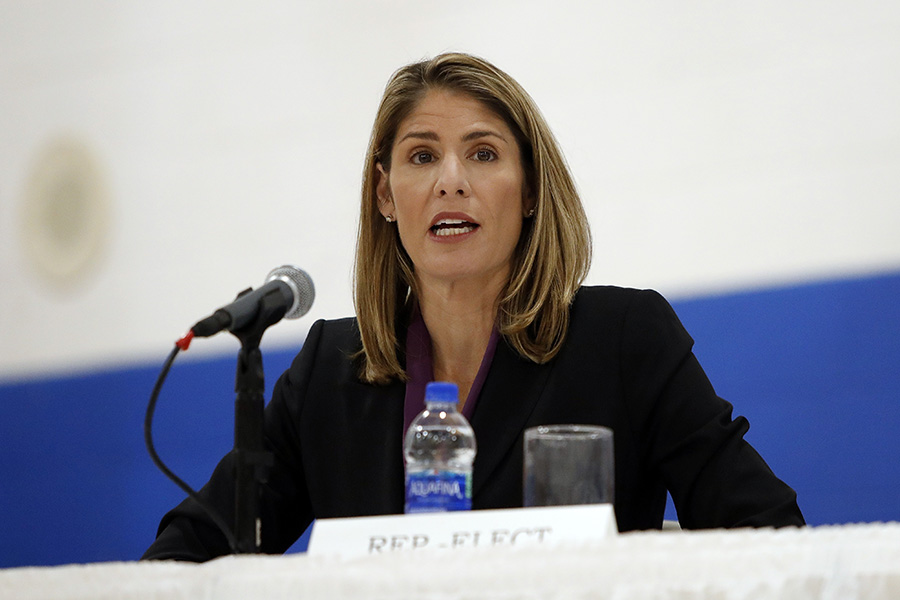Lori Trahan’s Campaign Finance Troubles Will Face Further Scrutiny from House Ethics Committee
The committee was quick to note that the review doesn't mean a violation occurred.

Photo via AP Photo/Winslow Townson
Two weeks before the Third Congressional District’s September primary, it looked like it was over for Lori Trahan, the Westford Democrat polling at fourth place.
But the tables turned when a windfall of funding revitalized Trahan’s campaign. Thanks to hundreds of thousands of new dollars, Trahan drastically increased her TV ads, and the payoff was swift—she quickly surpassed the other contenders, including Boston City Hall aide Dan Koh and attorney Juana Matias, and won an easy victory over the Republican candidate for the seat in November.
Since her election, however, the source of the mysterious, 11th-hour funds that arguably pushed Trahan over the top have been in question. And Tuesday, the House Ethics Committee announced that it’s furthering its probe of the Representative after investigators discovered “substantial reason” to believe she violated campaign finance laws last year.
According to the Boston Globe, the Office of Congressional Ethics revealed in a 16-page report Tuesday that Trahan’s husband, businessman David Trahan, donated $300,000 to her campaign. Initially, Trahan said that personal income from her consulting company Concire had sufficiently covered the late-game loan, but the report asserts that it was in fact Trahan’s husband who supplied the funds. A donation of this size, even from one’s spouse, would violate federal election law—last year, the individual limit on donations was $2,700.
It appears that the Trahan campaign took pains to conceal this sum by misrepresenting when the donations were made. For example, she loaned herself $50,000 on March 31 of last year, but investigators discovered that the joint account from which she wrote the check contained only $55.13. Days later, Trahan’s husband deposited money into the account to cover the check, and then the campaign cashed it. David Trahan also donated some funds from his business account, and per federal election law, businesses are barred from directly donating to candidates.
However, in their legal response to the OCE, Trahan’s council argues that these funds shouldn’t be subject to contribution limits because they were legally hers, regardless of which of the couple’s accounts they were in. It is an established fact that a candidate can make unlimited campaign contributions from his or her “personal funds,” and Trahan’s team argues that, thanks to a premarital agreement that gave both Lori and David equal rights to manage their marital property, the funds in question were legally hers to use.
“The funds were, in fact, her “personal funds” before they were transferred to her joint account,” the Trahan team’s legal response reads.
The legal response also points out that the FEC has historically affirmed this stance—that a candidate is permitted to use funds held in their spouse’s name as long as they have the right to manage and dispose the funds under state law—including in a case involving Jane Fonda.
The House Ethics Committee received the investigators’ report in September, but only made it public today. Per the Globe, the committee said it has not yet determined whether Trahan violated campaign finance law.
“The committee notes that the mere fact of conducting further review of a referral, and any mandatory disclosure of such further review, does not itself indicate that any violation has occurred, or reflect any judgment on behalf of the committee,’’ the committee said in a statement.
Trahan spokesperson Mark McDevitt asserted in a statement that the complaint that generated the referral came from “a right-wing group with a long history of attacking Democrats.”
“The Federal Election Commission has found no violations in numerous cases involving the use of marital assets that closely mirror Congresswoman Trahan’s use of funds, which is why we remain confident that any review will rule in her favor,” he said.
McDevitt seemed to be referencing an April complaint filed by the Foundation for Accountability & Civic Trust, a known conservative advocacy organization.
The multiple complaints filed with federal agencies about Trahan’s campaign finances have loomed over the representative for months. Rival Dan Koh has been particularly vocal about the issue after his narrow, 145-vote loss to Trahan last November, and is publicly mulling a 2020 challenge.
In October, Trahan took to Medium to try to put the questions surrounding her campaign funds to rest. In the post, Trahan admitted for the first time that the $300,000 infusion her campaign received was in fact earned by her husband. However, Trahan asserted that she and her husband have always considered their incomes to be shared, so she thought nothing of using funds that came from their joint account.
“I realize that I could have done it differently and that how I did has raised some questions,” she wrote at the time.
Trahan echoed the same sentiment in a response filed with the Ethics Committee. According to the Globe, Trahan admitted she “deeply regrets and takes responsibility for” her mistakes, but insisted the funds in question were her own.
This post has been updated to include a response from Trahan’s legal team.


